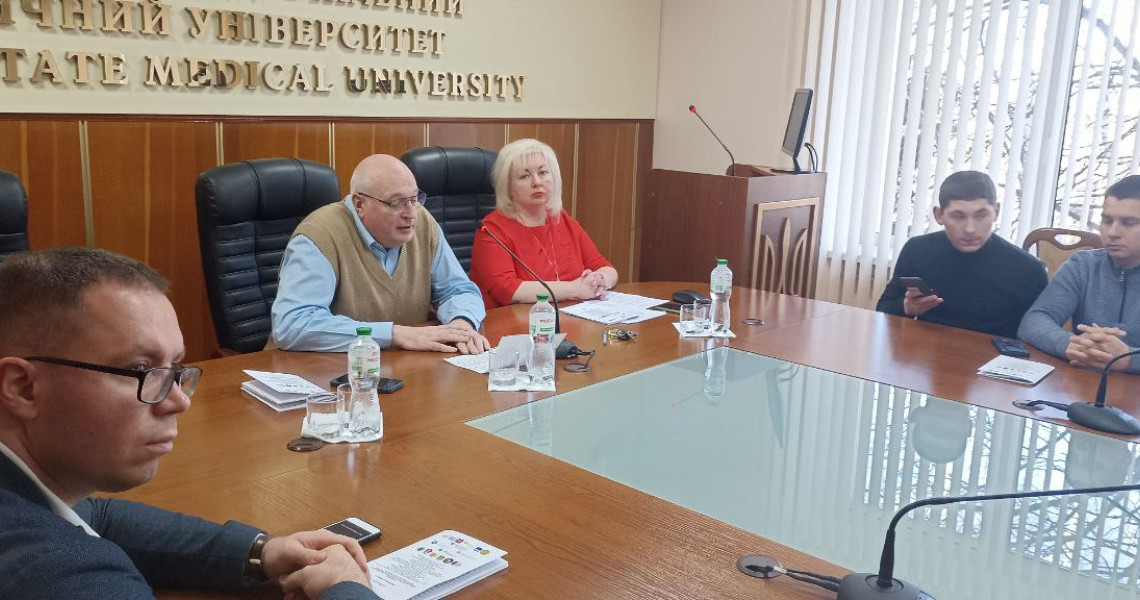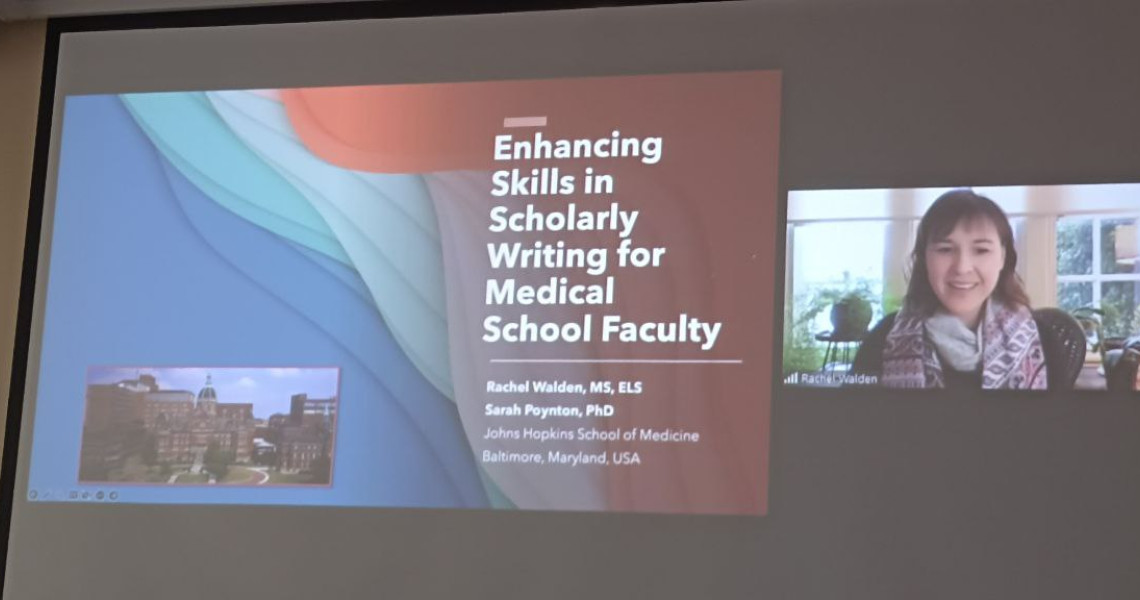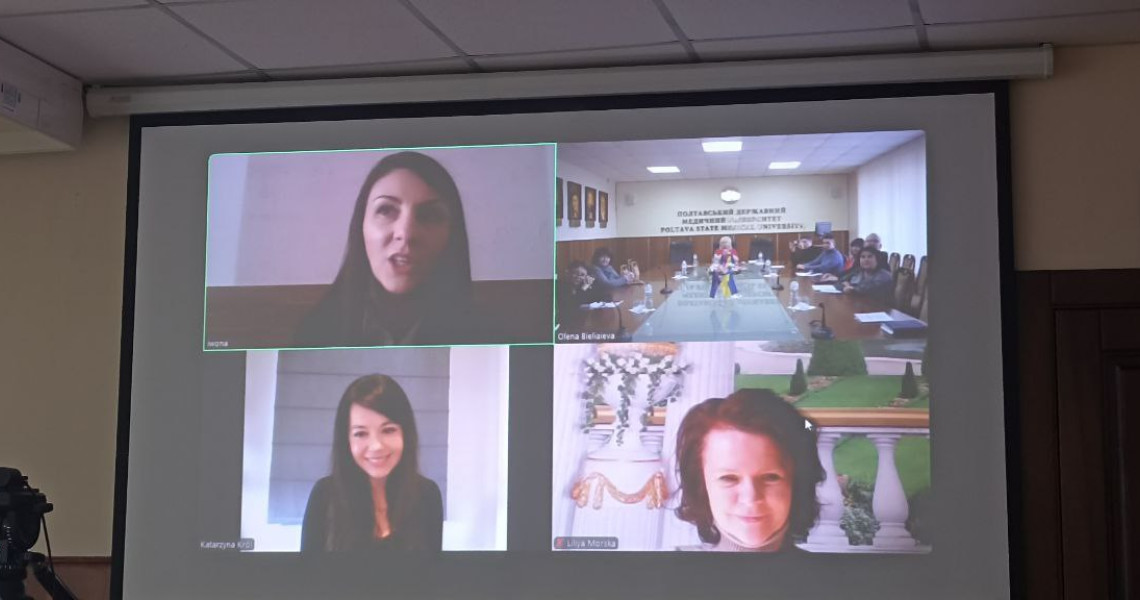12-14 лютого 2025 року в змішаному форматі на базі Полтавського державного медичного університету відбулася знакова подія – ІХ Міжнародна науково-практична конференція «Актуальні питання лінгвістики, професійної лінгводидактики, психології і педагогіки вищої школи», яка зібрала науковців з 16 країн світу – від Польщі до Канади, від Сполучених Штатів Америки до Сенегалу.
Упродовж цих трьох по-лютневому холодних днів конференція стала відкритою платформою для гарячого обговорення численних актуальних, а подекуди й гострих, питань, пов’язаних з: освітою, медичною зокрема; викладанням іноземних мов; академічною доброчесністю та етичними проблемами, зумовленими повсюдним використанням штучного інтелекту; викликами, з якими в умовах сьогодення стикаються викладачі у своїй професійній діяльності, падінням престижу професії вчителя і викладача зокрема, а також нівелюванням соціального статусу освітян; можливостями і перспективами застосування досягнень нейронауки в дидактиці; проблем підтримки й адаптації здобувачів освіти з особливими освітніми потребами.
Перелічена тематика далеко не охоплює всі доповіді, які були презентовані й обговорені на конференції представниками Полтавського державного медичного університету, Університету Джона Гопкінса (США), Університету Ковентрі (Великобританія), Університету Ла-Риохи (Логроньо, Іспанія), Вищої школи охорони здоров’я Візеу (Португалія), низки університетів Польщі – Жешувського, Бєльско-Бяла (факультет гуманітарних і соціальних наук Інституту неофілології), Державної академії прикладних наук імені Броніслава Маркевича в Ярославі, Університету інформаційних технологій і менеджменту в Жешуві, Силезького університету в Катовіцах, Університету Манітоби (Канада), Дакарської бізнес-школи, Університету Шрі-Джайеварденепура (Шрі-Ланка), провідних вітчизнах медичних університетів – Харківського, Вінницького, Львівського, Буковинського, Івано-Франківського, Національного університету охорони здоров’я імені П.Л. Шупика, НМУ імені О. Богомольця, немедичних закладів вищої освіти – Львівського національного університету природокористування, Національного технічного університету України «Київський політехнічний інститут імені Ігоря Сікорського», Харківського національного університету імені В.Н. Каразіна, Полтавського національний педагогічного університету імені В.Г.Короленка і Полтавського державного аграрного університету, Волинського національного університету імені Лесі Українки, Центральноукраїнського державного університету імені Володимира Винниченка, низки університетів Румунії, а також урядових і неурядових професійних асоціацій.
Від нашої alma mater учасників конференції вітали ректор, лауреат Державної премії України в галузі науки і техніки, заслужений лікар України, доктор медичних наук, професор Вячеслав Ждан, перший проректор з науково-педагогічної роботи, заслужений діяч науки і техніки України, академік Академії наук вищої школи України, доктор медичних наук, професор Валентин Дворник, лауреат Державної премії України в галузі науки і техніки, заслужений діяч науки і техніки України, доктор медичних наук, професор Ігор Кайдашев. Щирими й теплими словами вітали співорганізатори конференції із закладів-партнерів, розміщених у різних куточках світу.
Конференція підкреслила ключову роль сучасних технологій в освітньому процесі. Інноваційні засоби, як-от віртуальна і доповнена реальність, симуляційні технології та навчальні платформи здатні значно поліпшити якість освіти, медичної зокрема.
Особливу увагу було приділено питанням використання штучного інтелекту (ШІ) в освіті. Доповіді, присвячені ШІ, звучали впродовж усіх трьох днів роботи конференції і викликали палкі дискусії щодо того, чи може замінити ШІ викладача, чи не сприяє він порушенню академічної доброчесності, чи не привчає студентів та інші категорії здобувачів освіти до пасивного споживання накопиченої у цифровому світі інформації? На підставі обговорень учасники конференції сформулювали своє бачення щодо ШІ – він є ефективним інструментом для персоналізованого навчання, діагностики знань студентів, автоматизації оцінювання знань і поліпшення освітнього процесу загалом. Наголошувалося, що застосування технологій ШІ дає змогу викладачам створювати адаптивні навчальні програми, які підлаштовуються під індивідуальні потреби студентів, а також покращувати результати навчальних курсів за допомогою розумних платформ і симуляторів. Утім, ШІ не може замінити живу людину з її емоціями, знаннями, світоглядом, що, безумовно, повинні розуміти користувачі. Було підкреслено, що застосування технологій ШІ вимагає відповідальності та дотримання етичного підходу в роботі із цифровими інструментами, усвідомленого запобігання плагіату. Натомість його використання повинно йти на користь розвитку аналітичних навичок, критичного мислення та здатності самостійно розв'язувати складні завдання.
У рамках обговорення інноваційних методів викладання порушувалася тема застосування технологій «майндфулнес» («усвідомленості») в освіті. Одним із ключових питань конференції також став феномен Пігмаліона. Було наголошено, що позитивні очікування та підтримка з боку викладачів можуть значно покращити академічні результати студентів та їхню мотивацію. Важливим аспектом роботи конференції стало питання щодо подальшого впровадження фасилітаційних і персоналізованих підходів до навчання.
Пильну увагу було приділено нейродидактиці – новій галузі, що вивчає, як нейробіологічні процеси впливають на навчання та сприйняття інформації. Було наголошено на необхідності впровадження нейродидактичних підходів в освіту задля покращення засвоєння знань і формування вмінь та навичок, що передбачає використання наукових даних про нейропластичність, увагу та пам'ять з метою створення оптимальних умов для навчання і викладання.
Під час роботи конференції увага учасників неодноразово фокусувалася на питаннях, пов’язаних із формуванням навичок академічного письма. У представлених доповідях наголошувалося, що розвиток навичок академічного письма необхідний для ефективного написання наукових статей, звітів і дисертацій, власне, для писемної наукової комунікації. Важливими аспектами є розвиток критичного мислення, грамотне структурування інформації, використання наукового стилю та правильне цитування.
У процесі обговорення доповідей було підкреслено, що латинська мова продовжує залишатися основою міжнародної медичної термінології. Доповідачі наголошували, що знання латинської мови є необхідними для точного і коректного розуміння медичних термінів та їх використання в науковій і професійній практиці. Особливу увагу було приділено проблемам медичного перекладу, включно з необхідністю навчання здобувачів освіти точному і коректному перекладу медичних текстів, що передбачає урахування специфіки розвитку й функціонування медичної термінології. Учасники конференції підкреслили важливість лексикографічних досліджень, які відіграють важливу роль у стандартизації термінології, медичної зокрема, забезпечуючи там самим недвозначність фахової комунікації.
Значну увагу було приділено деонтологічній підготовці майбутніх лікарів, що є невід'ємною частиною їхнього професійного становлення. Під час конференції було також обговорено перспективи щонайширшого впровадження холістичного підходу в медичну освіту, який розглядає студента не тільки як носія знань, умінь і навичок, а й як особистість з її емоційними, психологічними, соціальними та культурними проявами та передбачає розвиток особистої відповідальності, самосвідомості та взаємодії з пацієнтом на всіх рівнях – фізичному, емоційному та соціальному.
Неодноразово наголошувалося на важливості десимінації та асиміляції кращих освітніх практик для підвищення якості освіти, медичної зокрема. Учасники конференції одностайно дійшли висновку, що обмін досвідом між закладами освіти та викладачами дає змогу імплементувати інноваційні методи та підходи в навчання, забезпечуючи високий рівень підготовки майбутніх фахівців. Тому активне використання сучасних платформ для обміну освітнім контентом, участь у міжнародних конференціях, проведення вебінарів та онлайн-курсів для поширення передових практик – це той шлях, яким повинні йти всі заклади освіти. Важливо, щоб найкращі освітні практики, які показують ефективні результати, були доступні для ширшого кола викладачів і студентів по всьому світу.
У резолюції конференції, що була прийнята її учасниками, наголошено на необхідності посилення міжнародного співробітництва у сфері освіти й науки. Відкриття нових горизонтів для спільних досліджень, обмін студентами та викладачами, а також реалізація спільних освітніх програм із зарубіжними університетами та науковими центрами – condicio sine qua non для поліпшення якості медичної освіти та підготовки фахівців, здатних працювати в умовах глобалізованого світу.
Poltava State Medical University in the forefront of science and education
On February 12-14, 2025, Poltava State Medical University hosted a landmark event in a mixed format - the IX International Scientific and Practical Conference “Topical Issues of Linguistics, Professional Linguodidactics, Psychology and Pedagogy of Higher Education”, which brought together scientists from 16 countries - from Poland to Canada, from the United States of America to Senegal.
Over the course of these three bitterly cold February days, the conference served as an open platform for fervent discussions on a multitude of pressing, and at times contentious, issues. These included topics such as education, particularly in the medical field; the teaching of foreign languages; academic integrity and ethical dilemmas arising from the pervasive use of artificial intelligence; the challenges faced by educators in their professional practice today, including the declining prestige of the teaching profession, especially among university lecturers, and the erosion of the social status of educators; the potential and prospects of applying advancements in neuroscience to pedagogy; and the challenges of supporting and accommodating students with special educational needs.
The aforementioned topics represent only a fraction of the presentations and discussions that took place at the conference, which featured contributions from representatives of Poltava State Medical University, Johns Hopkins University (USA), Coventry University (UK), the University of La Rioja (Logroño, Spain), the Higher School of Health in Viseu (Portugal), and a number of universities in Poland - including the University of Rzeszów, the University of Bielsko-Biała (Faculty of Humanities and Social Sciences, Institute of Neophilology), the State Academy of Applied Sciences in Jarosław, the University of Information Technology and Management in Rzeszów, and the University of Silesia in Katowice. Additionally, participants included the University of Manitoba (Canada), Dakar Business School, the University of Sri Jayewardenepura (Sri Lanka), and leading Ukrainian medical universities - such as Kharkiv National Medical University, Vinnytsia National Medical University, Lviv National Medical University, Bukovinian State Medical University, Ivano-Frankivsk National Medical University, the National University of Health of Ukraine named after P.L. Shupyk, and the O.O. Bogomolets National Medical University. Non-medical higher education institutions were also represented, including Lviv National University of Nature Management, the National Technical University of Ukraine "Igor Sikorsky Kyiv Polytechnic Institute," V.N. Karazin Kharkiv National University, Poltava V.G. Korolenko National Pedagogical University, Poltava State Agrarian University, Lesia Ukrainka Volyn National University, and the Volodymyr Vynnychenko Central Ukrainian State University. The conference also saw participation from several universities in Romania, as well as governmental and non-governmental professional associations.
The conference participants were warmly welcomed by representatives of our alma mater, including the Rector, Laureate of the State Prize of Ukraine in Science and Technology, Honored Physician of Ukraine, Doctor of Medical Sciences, Professor Vyacheslav Zhdan; the First Vice-Rector for Scientific and Pedagogical Work, Honored Scientist of Ukraine, Academician of the Academy of Sciences of the Higher School of Ukraine, Doctor of Medical Sciences, Professor Valentyn Dvornyk; and Laureate of the State Prize of Ukraine in Science and Technology, Honored Scientist of Ukraine, Doctor of Medical Sciences, Professor Igor Kaidashev. Sincere and heartfelt greetings were also extended by the co-organizers of the conference from partner institutions located in various corners of the world. The conference underscored the pivotal role of modern technologies in the educational process. Innovative tools, such as virtual and augmented reality, simulation technologies, and advanced learning platforms, have the potential to significantly enhance the quality of education, particularly in the medical field.
Special attention was devoted to the use of artificial intelligence (AI) in education. Presentations focusing on AI were delivered throughout all three days of the conference, sparking heated debates on whether AI could replace educators, whether it contributes to breaches of academic integrity, and whether it encourages students and other learners to passively consume the vast amounts of information accumulated in the digital world. Based on these discussions, conference participants formulated their perspective on AI: it is an effective tool for personalized learning, diagnosing students' knowledge, automating assessment processes, and enhancing the overall educational experience. It was emphasized that the application of AI technologies enables educators to create adaptive learning programs tailored to individual student needs, as well as to improve the outcomes of educational courses through intelligent platforms and simulators. However, AI cannot replace a human being with their emotions, knowledge, and worldview - a fact that users must fully understand. It was underscored that the use of AI technologies requires responsibility and adherence to ethical principles when working with digital tools, along with a conscious effort to prevent plagiarism. Instead, its application should aim to foster the development of analytical skills, critical thinking, and the ability to independently solve complex problems.
During the discussion of innovative teaching methods, the topic of applying "mindfulness" technologies in education was raised. One of the key issues addressed at the conference was the Pygmalion phenomenon. It was emphasized that positive expectations and support from educators can significantly enhance students' academic performance and motivation. An important aspect of the conference's work was the question of further implementing facilitative and personalized approaches to learning.
Considerable attention was also given to neurodidactics - a new field that explores how neurobiological processes influence learning and information perception. The necessity of integrating neurodidactic approaches into education was highlighted, aiming to improve knowledge acquisition and the development of skills and competencies. This involves leveraging scientific insights into neuroplasticity, attention, and memory to create optimal conditions for both teaching and learning.
Throughout the conference, participants repeatedly focused on issues related to the development of academic writing skills. The presented papers emphasized that cultivating academic writing skills is essential for effectively composing scientific articles, reports, and dissertations, and, more broadly, for written scientific communication. Key aspects include fostering critical thinking, organizing information coherently, employing an appropriate scientific style, and adhering to proper citation practices.
In the course of the discussion, it was emphasized that Latin continues to be the basis of international medical terminology. The speakers emphasized that knowledge of Latin is essential for accurate and correct understanding of medical terms and their use in scientific and professional practice. Particular attention was paid to the problems of medical translation, including the need to teach students to accurately and correctly translate medical texts, which involves taking into account the specifics of the development and functioning of medical terminology. The conference participants emphasized the importance of lexicographic research, which plays an important role in standardizing terminology, including medical terminology, thereby ensuring unambiguous professional communication.
Considerable attention was paid to the deontological training of future doctors, which is an integral part of their professional development. The conference also discussed the prospects for the widest possible implementation of a holistic approach to medical education, which considers the student not only as a carrier of knowledge, skills and abilities, but also as a person with his or her emotional, psychological, social and cultural manifestations and involves the development of personal responsibility, self-awareness and interaction with the patient at all levels - physical, emotional and social.
The importance of desimilation and assimilation of the best educational practices to improve the quality of education, including medical education, was repeatedly emphasized. The participants of the conference unanimously concluded that the exchange of experience between educational institutions and teachers allows to implement innovative methods and approaches in education, ensuring a high level of training of future specialists. Therefore, the active use of modern platforms for sharing educational content, participation in international conferences, webinars and online courses to disseminate best practices is the way all educational institutions should go. It is important that the best educational practices that show effective results are available to a wider range of teachers and students around the world.
The conference resolution adopted by its participants emphasized the need to strengthen international cooperation in education and science. Opening new horizons for joint research, exchange of students and teachers, and implementation of joint educational programs with foreign universities and research centers are condicio sine qua non for improving the quality of medical education and training specialists capable of working in a globalized world.








